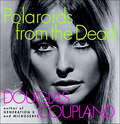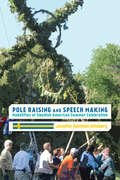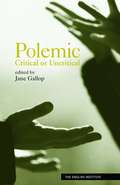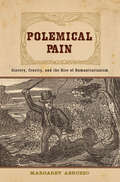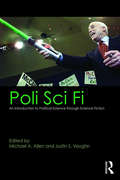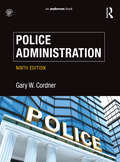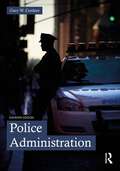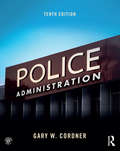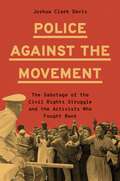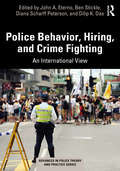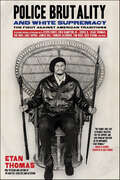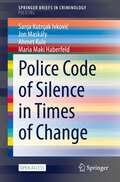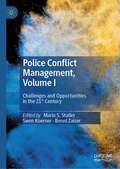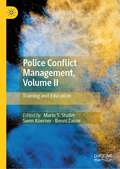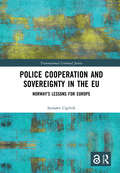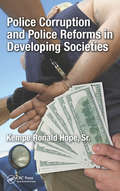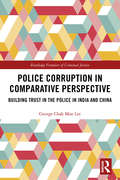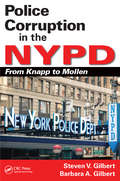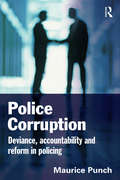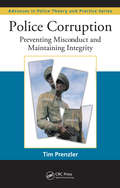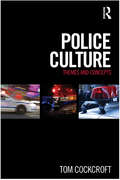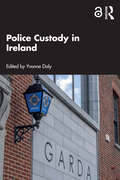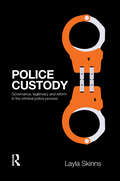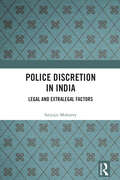- Table View
- List View
Polaroids from the Dead: And Other Short Stories
by Douglas CouplandDouglas Coupland takes his sparkling literary talent in a new direction with this crackling collection of takes on life and death in North America -- from his sweeping portrait of Grateful Dead culture to the deaths of Kurt Cobain, Marilyn Monroe and the middle class.For years, Coupland's razor-sharp insights into what it means to be human in an age of technology have garnered the highest praise from fans and critics alike. At last, Coupland has assembled a wide variety of stories and personal "postcards" about pivotal people and places that have defined our modern lives. Polaroids from the Dead is a skillful combination of stories, fact and fiction -- keen outtakes on life in the late 20th century, exploring the recent past and a society obsessed with celebrity, crime and death. Princess Diana, Nicole Brown Simpson and Madonna are but some of the people scrutinized.
Pole Raising and Speech Making: Modalities of Swedish American Summer Celebration (Ritual, Festival, and Celebration)
by Jennifer Eastman AtteberyIn Pole Raising and Speech Making, author Jennifer Eastman Attebery focuses on the beginnings of the traditional Scandinavian Midsummer celebration and the surrounding spring-to-summer seasonal festivities in the Rocky Mountain West during the height of Swedish immigration to the area—1880–1917. Combining research in folkloristics and history, Attebery explores various ways that immigrants blended traditional Swedish Midsummer-related celebrations with local civic celebrations of American Independence Day on July 4 and the Mormons’ Pioneer Day on July 24. Functioning as multimodal observances with multiple meanings, these holidays represent and reconsider ethnicity and panethnicity, sacred and secular relationships, and the rural and the urban, demonstrating how flexible and complex traditional celebrations can be. Providing a wealth of detail and information surrounding little-studied celebrations and valuable archival and published primary sources—diaries, letters, speeches, newspaper reports, and images—Pole Raising and Speech Making is proof that non-English immigrant culture must be included when discussing “American” culture. It will be of interest to scholars and graduate students in ethnic studies, folklore, ritual and festival studies, and Scandinavian American cultural history.
Polemic: Critical or Uncritical (Essays from the English Institute)
by Jane GallopThese new essays by leading scholars examine some famous and less well-known instances of polemical encounters. The essays are enhanced by an interview with Gayatri Spivak, specially conducted by Jane Gallop for this volume Historically rigorous, theoretically astute, and sometimes wickedly funny, Polemic makes criticism a critical issue.
Polemical Pain: Slavery, Cruelty, and the Rise of Humanitarianism (New Studies in American Intellectual and Cultural History)
by Margaret AbruzzoIn 2008 and 2009, the United States Congress apologized for the "fundamental injustice, cruelty, brutality, and inhumanity of slavery." Today no one denies the cruelty of slavery, but few issues inspired more controversy in the eighteenth and nineteenth centuries. Abolitionists denounced the inhumanity of slavery, while proslavery activists proclaimed it both just and humane. Margaret Abruzzo delves deeply into the slavery debate to better understand the nature and development of humanitarianism and how the slavery issue helped shape modern concepts of human responsibility for the suffering of others.Abruzzo first traces the slow, indirect growth in the eighteenth century of moral objections to slavery's cruelty, which took root in awareness of the moral danger of inflicting unnecessary pain. Rather than accept pain as inescapable, as had earlier generations, people fought to ease, discredit, and abolish it. Within a century, this new humanitarian sensibility had made immoral the wanton infliction of pain.Abruzzo next examines how this modern understanding of humanity and pain played out in the slavery debate. Drawing on shared moral-philosophical concepts, particularly sympathy and benevolence, pro- and antislavery writers voiced starkly opposing views of humaneness. Both sides constructed their moral identities by demonstrating their own humanity and criticizing the other’s insensitivity. Understanding this contest over the meaning of humanity—and its ability to serve varied, even contradictory purposes—illuminates the role of pain in morality. Polemical Pain shows how the debate over slavery’s cruelty played a large, unrecognized role in shaping moral categories that remain pertinent today.
Poli Sci Fi: An Introduction to Political Science through Science Fiction
by Justin S. Vaughn Michael A. AllenPoli Sci Fi: An Introduction to Political Science through Science Fiction allows readers, students, and instructors to explore the multiple worlds of science fiction while gaining a firm grasp of core political science concepts. This carefully composed text is comprised of sixteen brief chapters, each of which takes a prominent science fiction film or television episode and uses it to explore fundamental components of political science. The book is designed to serve as a supplemental text for undergraduate political science courses, especially Introduction to Political Science. The structure and content of the volume is shaped around the organization and coverage of several leading texts in this area, and includes major parts devoted to theory and epistemology, political behavior, institutions, identity, states, and inter-state relations. Its emphasis on science fiction—and particularly on popular movies and television programs—speaks to the popularity of the genre as well as the growing understanding that popular culture can be an extraordinarily successful vehicle for communicating difficult yet foundational concepts, especially to introductory level college students.
Police Administration
by Gary W. CordnerThis national best-selling text examines police administration from multiple perspectives: a systems perspective (emphasizing the interrelatedness among units and organizations); a traditional, structural perspective (administrative principles, management functions, and the importance of written guidelines); a human behavioral perspective (the human element in organizations); and a strategic management perspective (communications and information systems, performance evaluation, strategies and tactics, and prevailing and promising approaches to increasing effectiveness of police agencies). Coverage of management functions and organizational principles is streamlined while providing a stronger emphasis on diversity principles and on developing police agencies as learning organizations. A concluding chapter covers contemporary issues, including community engagement, collaboration, globalization, racial profiling, mass media, cybercrime, terrorism and homeland security. Case studies based on real-life events invite students to practice managing the conflicting circumstances, and Modern policing blog posts offer news and developments in the policing world.
Police Administration
by Gary W. CordnerPolice Administration, 11th Edition, is a best-selling textbook that examines police administration from multiple perspectives: a systems perspective (emphasizing the interrelatedness among units and organizations); a traditional, structural perspective (administrative principles, management functions, and the importance of written guidelines); a human behavioral perspective (the human element in organizations); and a strategic management perspective (communications and information systems, performance evaluation, strategies and tactics, and prevailing and promising approaches to increasing effectiveness of police agencies). Management functions and organizational principles are defined and explained while providing an emphasis on evidence-based policing, diversity principles, and developing police agencies as learning organizations. A concluding chapter covers contemporary themes such as community engagement and collaboration, important issues such as police legitimacy and predictive policing, and modern management perspectives such as emotional intelligence and servant leadership. Case studies based on real-life events invite students to practice managing conflicting circumstances, and Modern Policing blog posts offer up-to-date news and breaking developments in the policing world. This book is suitable for undergraduates studying police management and supervision in the US and for practitioners seeking promotion to senior management roles. The ancillaries available include instructor’s manual, test bank, and lecture slides for faculty and case studies for student use.
Police Administration
by Gary W. CordnerThis national best-selling text examines police administration from multiple perspectives: a systems perspective (emphasizing the interrelatedness among units and organizations); a traditional, structural perspective (administrative principles, management functions, and the importance of written guidelines); a human behavioral perspective (the human element in organizations); and a strategic management perspective (communications and information systems, performance evaluation, strategies and tactics, and prevailing and promising approaches to increasing effectiveness of police agencies). Coverage of management functions and organizational principles is streamlined while providing a stronger emphasis on diversity principles and on developing police agencies as learning organizations. A concluding chapter covers contemporary issues, including community engagement, collaboration, privatization, globalization, police legitimacy, police diversity, predictive policing, police technology, evidence-based policing, learning organizations, emotional intelligence (EQ), and servant leadership. Case studies based on real-life events invite students to practice managing the conflicting circumstances, and Modern Policing blog posts offer news and developments in the policing world.
Police Against the Movement: The Sabotage of the Civil Rights Struggle and the Activists Who Fought Back (Politics and Society in Modern America)
by Joshua Clark DavisA bold retelling of the 1960s civil rights struggle through its work against police violence—and a prehistory of both the Black Lives Matter and Blue Lives Matter movements that emerged half a century laterPolice Against the Movement shatters one of the most pernicious myths about the 1960s: that the civil rights movement endured police violence without fighting it. Instead, as Joshua Clark Davis shows, activists from the Congress of Racial Equality and the Student Nonviolent Coordinating Committee confronted police abuses head-on, staging sit-ins at precinct stations, picketing outside department headquarters, and blocking city streets to protest officer misdeeds. In return, organizers found themselves the targets of overwhelming political repression in the form of police surveillance, infiltration by undercover officers, and retaliatory prosecutions aimed at discrediting and derailing their movement.The history of the civil rights era abounds with accounts of physical brutality by county sheriffs and tales of political intrigue and constitutional violations by FBI agents. Turning our attention to municipal officials in cities and towns across the US—North, South, East, and West—Davis reveals how local police bombarded civil rights organizers with an array of insidious weapons. More than just physical violence, these economic, legal, and reputational attacks were designed to project the illusion of color-blind law enforcement.The civil rights struggle against police abuses is largely overlooked today, the victim of a willful campaign by local law enforcement to erase their record of repression. By placing activism against state violence at the center of the civil rights story, Police Against the Movement offers critical insight into the power of political resistance in the face of government attacks on protest.
Police Behavior, Hiring, and Crime Fighting: An International View (Advances in Police Theory and Practice)
by Dilip K. Das Diana Scharff Peterson John A. Eterno Ben StickleThis edited collection by internationally recognized authors provides essays on police behavior in the categories of police administration, police operations, and combating specific crimes. Individual chapters strike at critical issues for police today, such as maintaining the well-being of officers, handling stress, hiring practices, child sexual exploitation, gunrunning, crime prevention strategies, police legitimacy, and much more. Understanding how police are hired and behave is a way of understanding different governments around the world. The book will cover the practices of countries as diverse as China, Germany, India, Japan, Turkey, South Africa, the United States, and others. Readers will be exposed to aspects of police that are rarely, if ever, explored. The book is intended for a wide range of audiences, including law enforcement and community leaders and students of criminal justice.
Police Brutality and White Supremacy: The Fight Against American Traditions
by Etan ThomasAn NBA veteran offers engaging interviews and reflections that explore police brutality, white supremacy, and the struggle for racial justice in America. "Thomas's interviews demand careful reading by all who want to expose racism, hold police accountable, and create an American society that practices social justice." —Library Journal, a Best Book of the Year in Political Science/Civil Rights "My family and I are extremely grateful for the support and love from my brother in the movement, Etan Thomas." —Emerald Garner, daughter of Eric Garner Etan Thomas, an eleven-year NBA veteran and lifelong advocate for social justice, weaves together his personal experiences with police violence and white supremacy with multiple interviews of family members of victims of police brutality like exonerated Central Park Five survivor Raymond Santana and Rodney King’s daughter Lora Dene King; as well as activist athletes and other public figures such as Steph Curry, Chuck D, Isiah Thomas, Sue Bird, Jake Tapper, Jemele Hill, Stan Van Gundy, Kyle Korver, Mark Cuban, Rick Strom, and many more. Thomas speaks with retired police officers about their efforts to change policing, and white allies about their experiences with privilege and their ability to influence other white people. Thomas also examines the history of racism, white supremacy, and the prevalence of both in the current moment. He looks at the origins of white supremacy in the US, dating back to the country’s inception, and explores how it was interwoven into Christianity--interviewing leading voices both in and outside of the church. Finally, with prominent voices in the media and education, Thomas discusses the continued cultivation of these injustices in American society.Police Brutality and White Supremacy demands accountability and justice for those responsible for and impacted by police violence and terror. It offers practical solutions to work against the promotion of white supremacy in law enforcement, Christianity, early education, and across the public sphere. Featuring original interviews with: Steph Curry, Chuck D, Yamiche Alcindor, Isiah Thomas, Jemele Hill, Craig Hodges, Stan Van Gundy, Mark Cuban, Jake Tapper, Mahmoud Abdul-Rauf, Sue Bird, Kyle Korver, Rick Strom, Cenk Uygur, Tim Wise, Chris Broussard, Breanna Stewart, Rex Chapman, Stephen Jackson, Kori Mccoy, Lora Dene King, Chikesia Clemons, Raymond Santana, Alissa Findley, Amber and Ashley Carr, Michelle and Ashley Monterrosa, Chairman Fred Hampton Jr., Abiodun Oyewole, Marc Lamont Hill, Officer Carlton Berkley, Pastor John K. Jenkins Sr., Officer Joe Ested, Captain Sonia Pruitt, and Bishop Talbert Swan.
Police Code of Silence in Times of Change (SpringerBriefs in Criminology)
by Sanja Kutnjak Ivković Jon Maskály Ahmet Kule Maria Maki HaberfeldThis book explores the contours of the code of silence and provides policy recommendations geared toward creating an environment less conducive for police misconduct. It responds to the recent calls for police reform, in the wake of the perceived illegitimacy of police actions and the protection that the code of silence seems to provide to the police officers who violate the official rules. Using a case study of a medium-sized U.S. police agency, this book employs the lens of police integrity theory to provide empirically grounded explanations of the code of silence. It examines the potential effects of organizational factors and the attitudes of individual police officers on their willingness to adhere to the code of silence in cases of police corruption, the use of excessive force, interpersonal deviance, and organizational deviance. The book focuses on the following factors that could influence the police code of silence in the times of change: The impact of organizational rule dissemination, discipline, and disciplinary fairness on the scope of the code of silence The role organizational justice plays in shaping police officer willingness to report misconduct The effect that police officers’ self-legitimacy has on their decisions to adhere to the code The influence of peer culture on individual police officer amenability to maintain the code The relationship between officers’ views of themselves, the organization, and the community on their willingness to report misconduct
Police Conflict Management, Volume I: Challenges and Opportunities in the 21st Century
by Swen Koerner Mario S. Staller Benni ZaiserThis book, as part of a two volume set, provides a broad overview of the current state of research on conflict management in law enforcement contexts globally, with a focus on contemporary challenges and opportunities in policing globally and ethical considerations. They cover a wide range of interactions between police and the public. This volume (I) focusses on the challenges and opportunities, examining topics such as police legitimacy, police culture, violence, mental health, community relations and crisis situations. Volume II focusses on police training and education and the learning settings needed for police to professionally tackle contemporary challenges. These books bring together leading research that is determining the state of the art in communication, de-escalation, use of force, and other contemporary issues in policing, with practical Key Takeaways in each chapter. They broaden the field by focussing on research which goes beyond the US, including in Scandinavia, Switzerland, the Netherlands, Germany, the Republic of South Africa and Russia.
Police Conflict Management, Volume II: Training and Education
by Swen Koerner Mario S. Staller Benni ZaiserThis book, as part of a two volume set, provides a broad overview of the current state of research on conflict management in law enforcement contexts globally, with a focus on training and education. They cover a wide range of interactions between police and the public. This volume (II) focusses on training and education and the learning settings that play a prominent role in providing police officers with the knowledge structures, competencies, attitutes, and values that they need to professionally tackle contemporary challenges. Volume I focusses on the contemporary challenges and opportunities in policing and ethical considerations. These books bring together leading research that is determining the state of the art in communication, de-escalation, use of force, and other contemporary issues in policing, with practical Key Takeaways in each chapter. They broaden the field by focussing on research which goes beyond the US, including in Scandinavia, Switzerland, the Netherlands, Germany, the Republic of South Africa and Russia.
Police Cooperation and Sovereignty in the EU: Norway’s Lessons for Europe (Transnational Criminal Justice)
by Synnøve UgelvikThe State and the police are traditionally seen as closely connected phenomena. Today, however, rapid EU legal developments mean that European police forces are no longer tied to a specific national legal context or a specific territory in the way they used to be. Norway is not a member of the EU. Or is it? This book shows that although it lacks formal membership status, Norway has become part of almost all of the major EU police cooperation measures and agreements. Not only does this mean that foreign police forces may operate on Norwegian territory and vice versa, but in addition, a wide range of EU regulations and cooperation instruments are incorporated directly into Norwegian law. With the increased focus on international and transnational police cooperation in mind, what does it mean to be a sovereign state in Europe today? This book combines strong legal and theoretical analyses of a specific national system to show how this country is tied to and dependent on a wider international and supranational system of legal rules, technologies and concepts. This makes the book relevant not only for the Norwegian prosecution and police authorities, but also for readers outside Norway interested in exploring how and whether the police as a modern state function has changed through the implementation of international cross-border cooperation mechanisms.
Police Cooperation and Sovereignty in the EU: Norway’s Lessons for Europe (Transnational Criminal Justice)
by Synnøve UgelvikThe State and the police are traditionally seen as closely connected phenomena. Today, however, rapid EU legal developments mean that European police forces are no longer tied to a specific national legal context or a specific territory in the way they used to be. Norway is not a member of the EU. Or is it? This book shows that although it lacks formal membership status, Norway has become part of almost all of the major EU police cooperation measures and agreements. Not only does this mean that foreign police forces may operate on Norwegian territory and vice versa, but in addition, a wide range of EU regulations and cooperation instruments are incorporated directly into Norwegian law. With the increased focus on international and transnational police cooperation in mind, what does it mean to be a sovereign state in Europe today? This book combines strong legal and theoretical analyses of a specific national system to show how this country is tied to and dependent on a wider international and supranational system of legal rules, technologies and concepts. This makes the book relevant not only for the Norwegian prosecution and police authorities, but also for readers outside Norway interested in exploring how and whether the police as a modern state function has changed through the implementation of international cross-border cooperation mechanisms.
Police Corruption and Police Reforms in Developing Societies
by Kempe Ronald Hope Sr.Much of the literature on police corruption and police reforms is dominated by case studies of societies classified as developed. However, under the influence of globalization, developing societies have become a focal point of scholarly interest and examination. Police Corruption and Police Reforms in Developing Societies provides critical analyses
Police Corruption in Comparative Perspective: Building Trust in the Police in India and China (Routledge Frontiers of Criminal Justice)
by George Chak LeeHow has rapid economic modernization in China and India impacted upon policing? To what extent are the two police forces trusted by its citizens? Do the police carry out their duties in a fair and unbiased fashion? What does police corruption look like and why does it persist? And what are the influencing factors in decision-making at the moments-of-truth? Filling the lacuna of research into the police in China and India, this book offers a unique comparative study of the prevalence, nature and organization of police corruption in these countries. This book provides key insights into the relationships between rapid economic modernisation, urbanisation and crime, and its effects on police organisational culture and behaviour as well as on ethical decision making. Moreover, this book performs an audit on which country is better placed to tackle corruption and professionalise their police service. It offers a major contribution to comparative research on criminal justice. It is essential reading for all policing scholars and will be of interest to students of criminology, social and political sciences, development studies, Asian studies, and post-colonial studies.
Police Corruption in the NYPD: From Knapp to Mollen
by Steven V. Gilbert Barbara A. GilbertPolice Corruption in the NYPD: From Knapp to Mollen explores how the New York Police Department experienced two major investigations within a quarter of a century. It compares the states of corruption within the NYPD during the Knapp and Mollen commissions, examining why corruption continued and why the revealed ethical breaches became more serious
Police Corruption: Exploring Police Deviance and Crime
by Maurice PunchPolicing and corruption are inseparable. This book argues that corruption is not one thing but covers many deviant and criminal practices in policing which also shift over time. It rejects the 'bad apple' metaphor and focuses on 'bad orchards', meaning not individual but institutional failure. For in policing the organisation, work and culture foster can encourage corruption. This raises issues as to why do police break the law and, crucially, 'who controls the controllers'? Corruption is defined in a broad, multi-facetted way. It concerns abuse of authority and trust; and it takes serious form in conspiracies to break the law and to evade exposure when cops can become criminals. Attention is paid to typologies of corruption (with grass-eaters, meat-eaters, noble-cause); the forms corruption takes in diverse environments; the pathways officers take into corruption and their rationalisations; and to collusion in corruption from within and without the organization. Comparative analyses are made of corruption, scandal and reform principally in the USA, UK and the Netherlands. The work examines issues of control, accountability and the new institutions of oversight. It provides a fresh, accessible overview of this under-researched topic for students, academics, police and criminal justice officials and members of oversight agencies.
Police Corruption: Preventing Misconduct and Maintaining Integrity (Advances in Police Theory and Practice)
by Tim PrenzlerWhile many police officers undertake their work conforming to the highest ethical standards, the fact remains that unethical police conduct continues to be a recurring problem around the world. With examples from a range of jurisdictions, Police Corruption: Preventing Misconduct and Maintaining Integrity examines the causes of police misconduct and
Police Culture: Themes and Concepts
by Tom CockcroftPolice culture has for over half a century attracted interest from academics, students, policy-makers, police institutions and the general public. However, the literature of this area has proven to be diverse, sprawling and prone to contradiction which has led to an enthralling yet intricate body of knowledge that, whilst continuing to provoke interest and debate, has largely escaped any wider commentary. This book provides a comprehensive overview of the area of police culture primarily by situating it in the context of the literature of organisational culture. From this starting point, the idea of police culture is developed as an occupationally-situated response to the uniqueness of the police role and one in which our understanding is, at times, hindered by the challenges of definitional, operational and analytical concerns. The book then charts the development of our understanding of the concept, through traditional explanations to the contemporary, highlighting in turn the tensions that exist between the elements of continuity in the police world and those of change. Police culture: themes and concepts draws on research from the 1950s to the 21st century from the UK, USA and elsewhere to show how the historical trajectory of police work from its early origins through to the late modern present have imbued it with a complexity that is undermined by deterministic explanations that seek to simplify the social world of the police officer. This book will be of interest to academics and students studying the sociology of policing as well as criminology.
Police Custody in Ireland
by Yvonne DalyPolice Custody in Ireland brings together experts from policing studies, law, criminology, and psychology, to critically examine contemporary police custody in Ireland, what we know about it, how it operates, how it is experienced, and how it might be improved.This first-of-its-kind collection focuses exclusively on detention in Garda Síochána stations, critically examining it from human rights and best practice perspectives. It examines the physical environment of custody, police interview techniques, existing protections, rights, and entitlements, and experiences of specific communities in custody, such as children, ethnic minorities, non-English speakers, the Mincéir/Traveller community, and those with intellectual disabilities or Autism Spectrum Disorder. Police Custody in Ireland gives a snapshot of garda custody as it is now and makes important recommendations for necessary future improvements.An accessible and compelling read, this book will be of interest to those engaged in policing and criminology, as well as related areas of interest such as human rights, youth justice and disability studies.The Open Access version of this book, available at http://www.taylorfrancis.com, has been made available under a Creative Commons [Attribution-Non Commercial-No Derivatives (CC-BY-NC-ND)] 4.0 license.
Police Custody: Governance, Legitimacy and Reform in the Criminal Justice Process
by Layla SkinnsPolice custody acts as an important gateway to the criminal justice process. Much is at stake here for both staff and suspects as what happens in police custody can have important consequences further down the line. This book offers a timely contribution to research on police custody, which has been largely neglected for the last decade, and it is the first to examine the growing role given to civilians employed by the police or by private security companies within police custody areas. The book draws on a mixed-method study of two custody areas, one publicly-run, and the other largely privately-run. This empirical analysis explores anew suspects’ experiences of police custody from arrest to charge, including their access to due process rights such as phone calls, legal advice and detention reviews, as well as shedding light on the hitherto unexplored working relationships between the police, civilian police staff (public and private), legal advisers, doctors, appropriate adults and drug workers. These findings on the police custody process are used to examine pertinent socio-legal and theoretical matters connected to due process, the role of the police in policing, as well as procedural justice and legitimacy. The book integrates issues which are topical and of utmost empirical, theoretical and political significance, meaning that it is likely to have a broad appeal to students, academics, practitioners and policy-makers with an interest in the criminal justice process, policing and the sociology of law.
Police Discretion in India: Legal and Extralegal Factors
by Satyajit MohantyThis book is the first empirical study of police discretion in India. Going beyond anecdotal accounts, it addresses the issues and concerns of arrest discretion behaviour of police with analysis of available literature internationally, testing the validity in the context of police in India and explaining the gap that exists between the legislative intent and field law enforcement. It establishes how extralegal determinants like subculture, environment and situations influence arrest discretion as much as legal determinants such as statutes, rules, manuals and court rulings. It also provides vital explanations on the working of the police system in India. The volume will be of great interest to policymakers, police leaders, officers of judiciary, scholars and researchers of criminology and criminal justice, sociology and social anthropology and South Asian studies.
